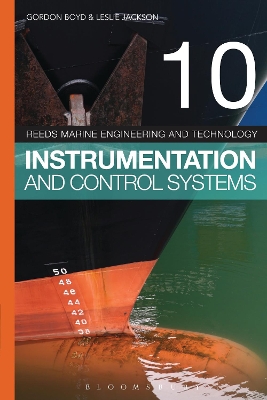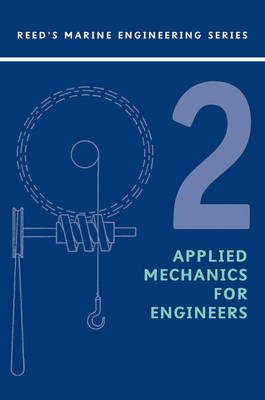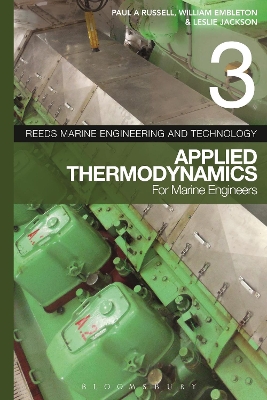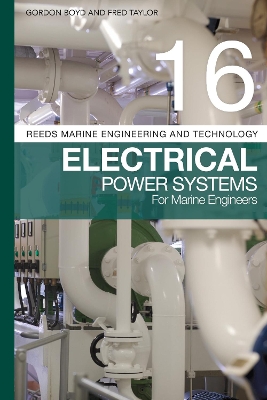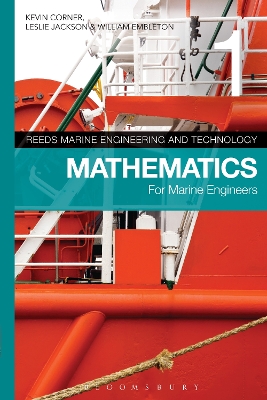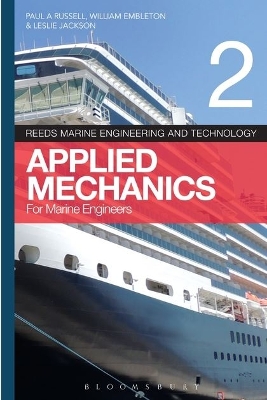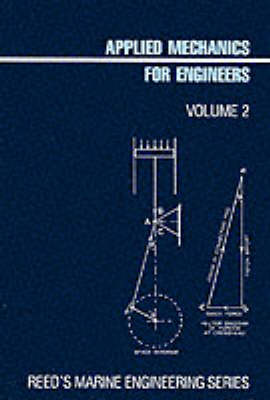Reeds Marine Engineering and Technology
7 total works
Reeds Vol 10: Instrumentation and Control Systems
by Gordon Boyd and Leslie Jackson
Published 1 January 2013
This is a fully revised, new edition on the topic of instrumentation and control systems and their application to marine engineering for professional trainees studying Merchant Navy Marine Engineering Certificates of Competency (CoC) as well as Electrical/Marine Engineering undergraduate students. Providing generic technical and practical descriptions of the operation of instrumentation and control devices and systems, this book also contains mathematic analysis where appropriate.
Addressing this subject area, the domain of Instrumentation Engineers/Technicians as well as Control Engineers, and covering established processes and protocols and extensive developing technology, this textbook is written with the marine engineer in mind, particularly those studying Engineering Knowledge. The content ranges from simple measurement devices, through signal conditioning and digitisation to highly sophisticated automated control and instrumentation systems.
It also includes a brand new section on electrical equipment in hazardous areas detailing hazards, gas groups, temperature classifications and types of protection including increased and intrinsic safety and encapsulation, and up-to-date material on the new generation of Liquified Natural Gas carriers, SMART sensors and protocols, as well as computer based systems.
This text is reinforced throughout with worked examples and self-study questions.
Addressing this subject area, the domain of Instrumentation Engineers/Technicians as well as Control Engineers, and covering established processes and protocols and extensive developing technology, this textbook is written with the marine engineer in mind, particularly those studying Engineering Knowledge. The content ranges from simple measurement devices, through signal conditioning and digitisation to highly sophisticated automated control and instrumentation systems.
It also includes a brand new section on electrical equipment in hazardous areas detailing hazards, gas groups, temperature classifications and types of protection including increased and intrinsic safety and encapsulation, and up-to-date material on the new generation of Liquified Natural Gas carriers, SMART sensors and protocols, as well as computer based systems.
This text is reinforced throughout with worked examples and self-study questions.
Reeds: Applied Mechanics for Marine Engineering
by William Embleton and Leslie Jackson
Published 21 February 2003
This book covers the syllabuses in Applied Mechanics for all classes of the Marine Engineers' Certificates of Competency of the Department of Transport. It will also be useful to students on BTEC and SCOTVEC engineering courses. Basic principles are dealt with beginning at a fairly elementary stage. Each chapter has fully worked examples interwoven into the text, test examples are set at the end of each chapter, and some typical exam questions are included. The prefix 'f' is used to indicate those parts of the text, and some test examples, which are of Class 1 standard.
Reeds Vol 3: Applied Thermodynamics for Marine Engineers
by Alan Murphy, William Embleton, Paul Anthony Russell, and Leslie Jackson
Published 31 January 2013
This book covers the principal topics in thermodynamics for officer cadets studying Merchant Navy Marine Engineering Certificates of Competency (CoC) as well as the core syllabi in thermodynamics for undergraduate students in marine engineering, naval architecture and other marine technology related programmes.
This new edition will cover the laws of thermodynamics and of perfect gases, their principles and application in a marine environment.
This key textbook takes into account the varying needs of marine students, recognising recent changes to the Merchant Navy syllabus and current pathways to a sea-going engineering career, including National Diplomas, Higher National Diploma and degree courses.
This new edition will cover the laws of thermodynamics and of perfect gases, their principles and application in a marine environment.
This key textbook takes into account the varying needs of marine students, recognising recent changes to the Merchant Navy syllabus and current pathways to a sea-going engineering career, including National Diplomas, Higher National Diploma and degree courses.
Reeds Vol 16: Electrical Power Systems for Marine Engineers
by Gordon Boyd and Fred Taylor
Published 17 September 2020
Within the marine and offshore industry, there is a clear and growing need for increased training and education on the use of electrical power systems. The number of electrical plant and appliances now in service has grown at an alarming rate in recent years, as has the amount of electrical power generated and utilised on board.
Large passenger ships now carry as many electrical officers as marine engineers, and electrical propulsion is now in common use by LNG carriers, small parcel tankers, oil tankers, ferries, offshore support, the navy, fleet auxiliary, cable layers and cruise ships. A number of shipping companies now award the Chief Electro Technical Officer the equivalent rank to the ship’s master and Chief Engineer. These developments have resulted in the establishment of a Foundation Degree programme for Electro Technical Officers and the current development of full degree programmes. As such, a targeted textbook for students on the subject is required.
As with all titles in the Reeds Marine Engineering Series, this book will be written in clear, accessible language, so as to be of use to all students and particularly those for whom English isn’t their first language. Technical drawings and diagrams will be used throughout and each chapter will be accompanied by example examination questions.
Large passenger ships now carry as many electrical officers as marine engineers, and electrical propulsion is now in common use by LNG carriers, small parcel tankers, oil tankers, ferries, offshore support, the navy, fleet auxiliary, cable layers and cruise ships. A number of shipping companies now award the Chief Electro Technical Officer the equivalent rank to the ship’s master and Chief Engineer. These developments have resulted in the establishment of a Foundation Degree programme for Electro Technical Officers and the current development of full degree programmes. As such, a targeted textbook for students on the subject is required.
As with all titles in the Reeds Marine Engineering Series, this book will be written in clear, accessible language, so as to be of use to all students and particularly those for whom English isn’t their first language. Technical drawings and diagrams will be used throughout and each chapter will be accompanied by example examination questions.
Reeds Vol 1: Mathematics for Marine Engineers
by Kevin Corner, Leslie Jackson, and William Embleton
Published 1 January 2013
This exciting new edition covers the core subject areas of arithmetic, algebra, mensuration in 2D and 3D, trigonometry and geometry, graphs, calculus and statistics and probability for Marine Engineering students for the Merchant Navy OOW qualification.
Initial examples have been designed purely to practise mathematical technique and, once these skills have been mastered, further examples focus on engineering situations where the appropriate skills may be utilised. The practical questions are primarily from a marine engineering background but questions from other disciplines, such as electrical engineering, will also be covered, and reference made to the use of advanced calculators where relevant.
Initial examples have been designed purely to practise mathematical technique and, once these skills have been mastered, further examples focus on engineering situations where the appropriate skills may be utilised. The practical questions are primarily from a marine engineering background but questions from other disciplines, such as electrical engineering, will also be covered, and reference made to the use of advanced calculators where relevant.
The book covers the principal topics in applied mechanics for professional trainees studying Merchant Navy Marine Engineering Certificates of Competency (CoC) as well as the core syllabi in applied mechanics for undergraduates studying for BSc, BEng and MEng degrees in marine engineering, naval architecture and other marine technology related programmes.
The revised version takes into account the need of these students, recognising recent changes to the Merchant Navy syllabus and current pathways to a sea-going engineering career, including National diplomas, Higher National Diploma and degree courses.
Basic principles are dealt with, beginning at a fairly elemental stage, with this new edition applying the underlying principles to a shipping environment. Each chapter has fully worked examples interwoven into the text, with test examples set at the end of each chapter. Other revisions include examples reflecting modern machines and practice, current legislation and current syllabi.
The revised version takes into account the need of these students, recognising recent changes to the Merchant Navy syllabus and current pathways to a sea-going engineering career, including National diplomas, Higher National Diploma and degree courses.
Basic principles are dealt with, beginning at a fairly elemental stage, with this new edition applying the underlying principles to a shipping environment. Each chapter has fully worked examples interwoven into the text, with test examples set at the end of each chapter. Other revisions include examples reflecting modern machines and practice, current legislation and current syllabi.
Steam Engineering Knowledge for Marine Engineers
by Leslie Jackson and Thomas D. Morton
Published November 1969
This book is a companion to Volume 8 - General Engineering Knowledge" in the "Reed's Marine Engineering Series", and is based on the DoT sylabus of Engineering Knowledge for the Class 2 and Class 1 Engineers Steam Certificates and Steam Endorsements. It includes a selection of questions of the type set in the exams for Class 2 and Class 1 Engineers."
